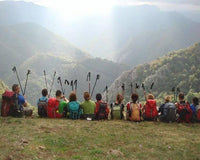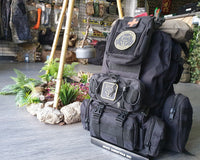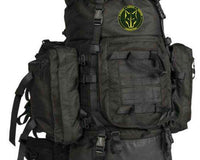Survival psychology is a fundamental part of our activities and courses in Survival Techniques and emergencies, both in the natural environment and civil emergencies (preparedness).
And why?
Because every day we face situations and problems that cause us stress, but we're more or less used to dealing with them. The problem arises when we face something we're not used to; that's where prior training and, of course, experience make a difference.

What happens in our brain when we experience a scary situation?
Fear, when generated, triggers a series of physiological responses in our body.
- • Increased heart rate
- • Sweating
- • Dilation of the pupils
- • And release of hormones such as adrenaline and cortisol
Fear is a defense mechanism for our survival that has been developing since primitive times, to put our bodies on alert.
The part of our brain that is responsible for managing these situations is the “Limbic System”
At the deepest part is the Amygdala, the most primitive part of the most evolved area, the prefrontal lobe.
It's that siren or alarm that goes off in the first few moments to alert us and reconfigure our body for fight or flight.
When we face an emergency or survival situation that threatens us, the amygdala comes into play.
The Hippocampus works in close connection with the amygdala.
The hippocampus and prefrontal cortex carry out rational analysis, helping the brain interpret the perceived threat by processing the information and helping us determine whether the perceived threat is real or not, depending on the context.
If we see a brutal attack on the street, it can put us on alert, tense, panicky, or in a state of attack, but if we see it on television, we understand that it poses no danger to us and that it's just a movie. This is the difference in context.
In the same way, when we have had training or attended courses and training, when faced with an emergency, and understand that we have the necessary tools and knowledge to deal with it, we will be able to:
- Calm down
- Really analyze the situation
- Assess the emergency or threat
- Facing it with reason and confidence
Somehow, rational analysis has convinced the emotional response that, although danger exists, we are capable of dealing with it.
This dialogue occurs differently for each person, and is influenced by our experiences, knowledge, and training tools.

When a human being enters an emergency situation and all secondary actions are deactivated, the brain consumes only 25% of the blood. In these emergency situations, cerebral blood flow is reduced to a minimum and redirected to the muscles. Digestive and sexual functions are deactivated, the adrenal glands are activated, and the body is ready for immediate action, to perform at its maximum physical capacity.
We must be able to be alert while also having our minds prepared to think and rationalize.
The mind and body are intimately connected; our mental control depends on how calm we are and how well we react to an emergency threat.
It is important to stay calm with positive thoughts
Everything we perceive around us is stored by the brain like a hard drive in folders such as anxiety, terror, panic, etc., as well as sensations of joy, happiness, love, desire, character, and courage.
We must learn to keep in mind the second folders before the first ones.
But what happens when a situation overwhelms us? We run the risk of becoming blocked and letting events take over, unable to respond.
When we are unable to offer an adequate response to a survival or emergency situation, you can all guess what the outcome might be.
Finally, when a situation surprises us, such as in survival or emergency situations, we must be able to avoid allowing the amygdala to take control of the situation, blocking us and leaving us without a response.
We must let the Hippocampus take the initiative and make ourselves believe that, with our predisposition, skills, and tools in the form of knowledge and experience, we can get out of this situation in the best possible way.
This isn't achieved just by reading books or watching documentaries; it's also achieved through practice and the acquisition of skills through meaningful learning.
Remember that when overcoming a survival or emergency situation, one of our greatest tools is to have positive thoughts, and never forget to have your small victory of the day.
Gain knowledge, practice, test yourself.






